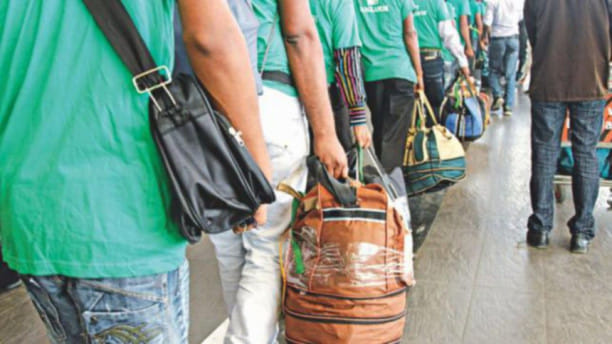Injured migrant workers need better support to rebuild their lives

My flight back to Dhaka from Kuala Lumpur is usually not that eventful. I go to the airport, check my luggage in, go through the immigration process and then when it's time board a plane along with many other families heading home.
However, this time it was quite different. As I boarded the plane early January, I noticed there were quite a few migrant workers returning home. Now, migrant workers heading home is nothing new, rather it's quite natural. But this time it was different. They were all going back without their consent or unwillingly. Then again, they did not have any option left either. The five persons I saw in the plane were suffering from workplace injuries and had to return home maimed.
One of them was Hossain Mia of Tangail's Madhupur who sat next to me.
With the hope of changing the lot of his poor family, Hossain went to Malaysia back in 2020 as a worker at a high-rise construction site. Things went well for him for the first couple of years. He stayed in a mess next to the work site and saved whatever he could to support his family back home.
Everything changed for him in September 2024 when he had a workplace accident that changed the course of the 34-year-old's life forever.
While cleaning a high-rise building from outside, Hossain fell from the third-floor and fractured his several bones.
He said he underwent treatment at a hospital for nearly three months, after which his employer decided to send him home as he would not continue his treatment anymore.
When I met him, I saw Hossain sitting on a seat by the window and staring at the clouds pass by through the small window.
"It was just before lunch and I stood on a platform outside the building. The platform I believe was made of tin. I don't remember exactly what happened. The weather was extremely hot, felt like the sun was right over my head. I felt dizzy," Hossain told me after the initial jitteriness.
"My body still hurts and I am still on medication," he said. "Doctors told me to avoid lifting heavy objects."
I could see sadness in his eyes. I tried to console him by saying that he is alive and he will get to see his wife and son soon.
"I don't know how I am going to make ends meet now. I am not an educated person. I spend everything I had and even had to borrow money to go abroad. Now I am returning empty handed," he said.
Hossain's story is not the only one.
Migrant workers are the backbone of our economy as they bring in foreign currency. Yet, they continue to be neglected and receive minimal support in home and abroad. Bangladesh sends tens of thousands of migrant workers abroad each year. Of them, scores are forced to returned early after getting injured or falling ill in the host countries.
The Wage Earners' Welfare Board (WEWB), under the expatriates' welfare ministry, provides multiple services to the workers, services for the ailing or injured returnee migrants are scarce.
At present, the board only gives such migrant workers a maximum Tk 1.50 lakh for treatment and ambulance service from the country's airports.
"How am I going to survive on that paltry sum," Hossain asked after hearing about the amount from me.
This is in no way sufficient to address the sufferings of injured returnee migrant workers. Many of them need long-term treatments and face financial challenges to survive.
From 2010 to January 2023, Tk 14.4 crore has been distributed among 1,508 returnee migrant workers for treatment, according to WEWB website.
However, the responsibility of the government does not just end there. The government must step up and come up with a multipronged approach to address this crucial issue.
The expatriates' welfare ministry or welfare board has an important role to play here. They need to take steps to ensure special care at government hospitals for those returnee migrants who need long-term treatment.
Besides, there should be a "social safety net" programme for ailing or injured returnee migrant workers that will ensure their survival. In addition to that, authorities need to arrange awareness campaigns to make aware migrant workers about their health and safety issues before their migration.
The embassies in the host countries need to play an active role too. They should form a special wing to look after the migrant workers or once a worker gets injured in a workplace related accident. They also need to organise regular health checkups for Bangladeshi migrant workers.
Also, workers need to be aware of the challenges they might face in the host countries, especially those related to health. They also need to be aware of the scopes of treatment there. Bangladesh missions can play an active role in this regard.
Migrant workers are the true heroes of our country. They are not just fortune seekers who travel to unknown destinations to improve their lives, they are also fortune makers as they take the country forward with them. The government needs to come up with better policies, a more robust system, skills development programmes and safe employment opportunities for the migrant workers.
This way even if a migrant worker is injured and forced to return home, he or she will be able to reintegrate into the society and contribute in a meaningful way. We have to remember, these returnee migrant workers, injured or not, are still a productive and an important asset to the country.
The time for action is now. Our remittance heroes deserve better.
Afruza Akter is a student of Doctor of Philosophy in Media and Communication Studies, Taylor's University, Malaysia
Dr Tan Kim Hua is an associate professor at Taylor's University, Malaysia





 For all latest news, follow The Daily Star's Google News channel.
For all latest news, follow The Daily Star's Google News channel.
Comments